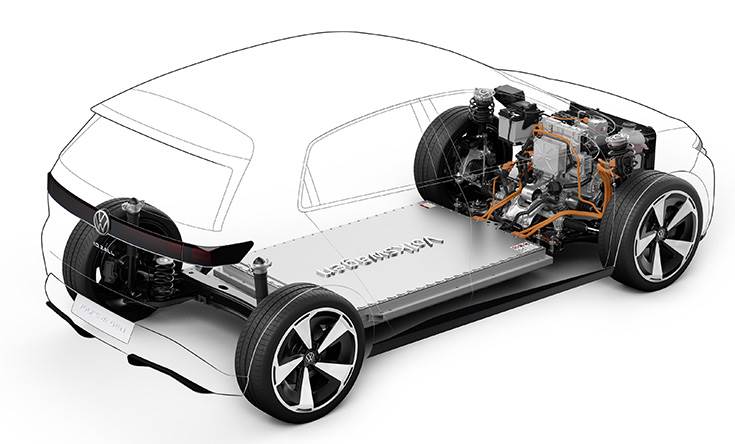The new Volkswagen ID 2all concept previews a new sub-22,000-euro electric car set to go on sale in 2026 – and showcases the brand’s new design language, which draws from classic models such as the Volkswagen Beetle, Golf and Polo.
The new Peugeot e-208 and Vauxhall Corsa-e rival will be the first model to use the long-anticipated MEB Entry platform that has been developed by the Volkswagen Group. This will also be used for the production version of the Cupra Urban Rebel concept, a future Skoda crossover and a second Volkswagen model: a compact crossover that will feature more rugged styling inspired by models such as the T-Cross and T-Roc.
The ID 2all will sit under the Volkswagen ID 3 in the firm’s EV line-up, with VW describing it as being “as spacious as a Golf and as inexpensive as a Polo”. The firm said the goal is for the machine to be sold with a starting price of less than 25,000 euros (Rs 22 lakh).
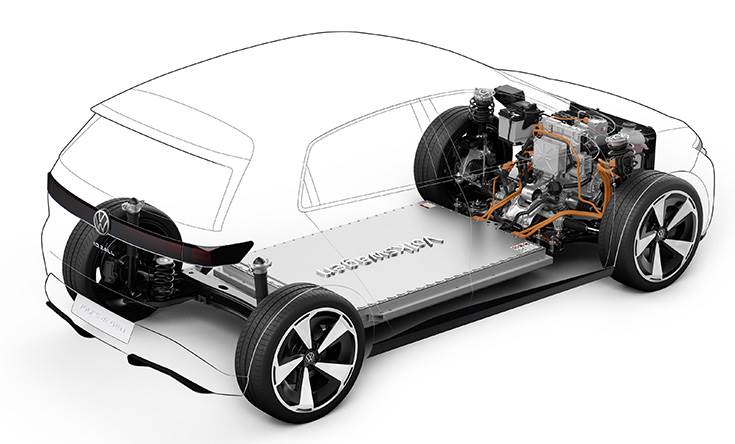
The ID 2all will be the first model to use the long-anticipated MEB Entry platform that has been developed by the Volkswagen Group.
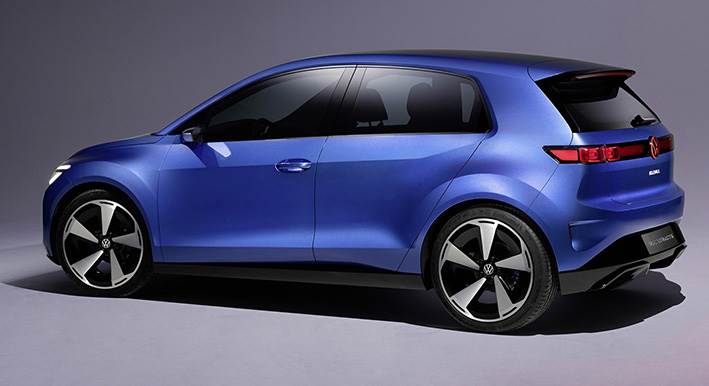
All-new design language
Significantly, the ID 2all showcases an entirely new design language that will feature on all of the firm’s future EVs. This is part of a major brand revamp that’s intended to, in the words of boss Thomas Schäfer, “make Volkswagen a genuine love brand”.That philosophy involves the firm embracing its heritage as a key point of difference from new EV rivals, and the ID 2all shows clear influences from the Polo and Golf, with more traditional styling than the ID 3.
Volkswagen previously revealed an ID Life crossover concept that was intended to preview the first MEB Entry model, but that has now been shelved after it received a poor reception.
New design boss Andreas Mindt, who moved across from Bentley in February, has used the ID 2all concept to establish a new design language. Remarkably, Mindt and his team designed the new concept model in just six weeks, and had to work around the already established fixed points of the MEB Entry platform.
The ID 2all is 4050mm long, making it slightly shorter than the current Polo, but its 2600mm wheelbase is significantly longer, allowing for far greater interior space.
It features a 490-litre boot, with 1330 litres of capacity when the rear seats are folded down.
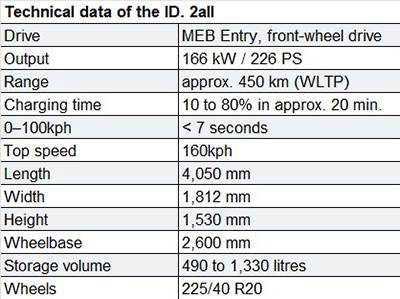
Claimed range of up to 450km
Notably, the MEB Entry platform is front-wheel-drive, while EVs built on the existing MEB platform offer rear-wheel-drive and four-wheel-drive powertrains. The front-mounted motor will produce 223bhp, and the ID 2all has a claimed range of up to 280 miles / 450 kilometres.
The decision to switch the platform to front-wheel-drive was to maximise the space available for luggage, enabling that large boot.
The platform can accept two battery sizes – 38kWh and 56kWh – each of which use different battery cell technology. While that maximum claimed range of 280 miles is for the 56kWh unit, the entry-level £22,000 ones will feature the smaller battery.
Volkswagen describes the drivetrain, battery and charging technology as “particularly efficient”. While the 38kWh batteries will use lithium-iron-phosphate prismatic cells, the firm has yet to disclose the chemistry of the later unit.
Volkswagen claims the 58kWh battery in the ID 2all will be able to complete a 10-80% charge in around 20 minutes, and will have a maximum charging rate of 125kW.
The car has a top speed of 160kph and a 0-100kph time of less than 7.0sec.
Mindt said Volkswagen is “transferring the DNA of our icons into the future”, adding that the ID 2all is “therefore also an homage to the Beetle, Golf and Polo.” He said it shows how future VWs will build on three design pillars: stability, likeability and excitement.
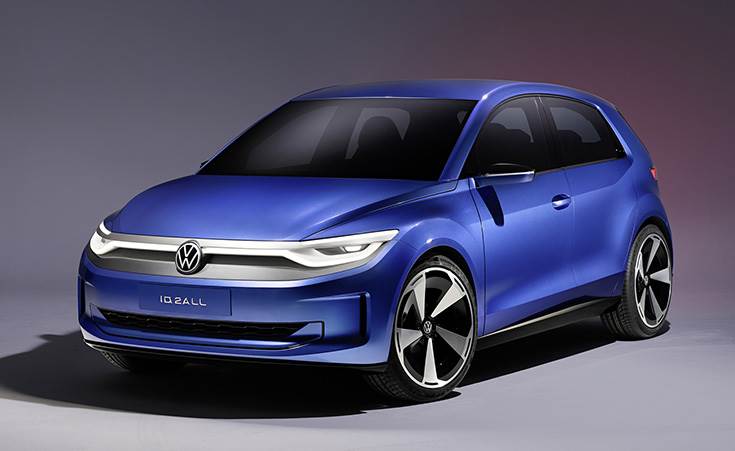
Classic cues include a C-pillar design intended to evoke the Mk1 Golf, which builds on “a general feature of compact Volkswagen models”. Mindt has also reduced the volume above the wheels in order to give the car a more powerful stance on the road.
The revamped front end features a number of “upwardly rising elements”, which Mindt said are crucial to give the car “a confident smile” and likeability. He added: “It’s important for us that the front of a Volkswagen shows a human expression.”
Mindt said that despite the comparatively low target price, the ID 2all has “high-quality materials” inside to add excitement, highlighting the driving-mode selector switch as an example.
There was also a focus on maximising the interior space: the passenger seat backrest can fold down and the rear seats split 40:60.
There’s an extra storage box underneath the boot floor and a lockable 50-litre storage area under the rear bench seats. That area is intended to be used for charging cables and a breakdown kit, while also offering secure storage for valuables.
What’s inside?
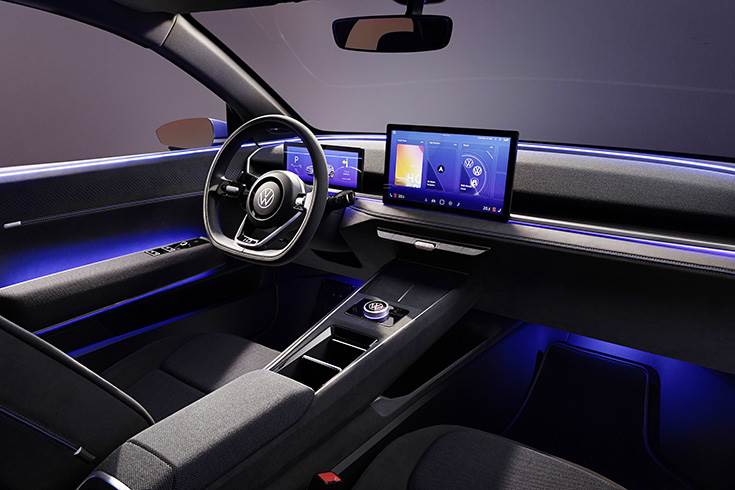
The interior of the car is described as having a “clear design”, with Volkswagen highlighting that the 12.9in infotainment touchscreen offers a “self-explanatory infotainment system with classic volume control” – an acknowledgement of the much-criticised infotainment and ‘slider’ controls on previous ID models and the Mk8 Golf.
A central panel features a thumb wheel for controlling the infotainment, plus a separate air-conditioning control panel, with the key functions accessed by illuminating buttons.
There are two wireless charging smartphone pads and a new multifunction steering wheel with pared-back controls. There’s also a 10.9in digital cockpit screen, augmented by a head-up display.
Volkswagen said the ID 2all will be offered with some of the advanced assistance systems usually only seen on higher-end models, including Travel Assist and Park Assist, LED matrix headlights, massaging electric seats and a panoramic sunroof.
The production version of the ID 2all will be shown in 2025 before entering production in Spain, alongside the closely related Cupra and Skoda models.
It will be one of 10 EVs that Volkswagen will launch by 2026, also including the facelifted ID 3, the long-wheelbase ID Buzz, the ID 7sedan and the compact SUV that will join the ID 2all in using the MEB Entry platform.
Notably, “in spite of all the challenges”, Volkswagen is also working on an EV that will have a starting price of less than €20,000 (£17,600).
ALSO READ: Volkswagen confirms ID 1 as entry-level EV
